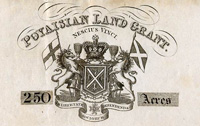Here’s the sixteenth installment of LiteratEye, a series found only on The Art of the Prank Blog, by W.J. Elvin III, editor and publisher of FIONA: Mysteries & Curiosities of Literary Fraud & Folly and the LitFraud blog.
LiteratEye #16: Missed the Long Slide on the Slippery Economic Slope? It’s Not Too Late to Fake It
By W.J. Elvin III
June 5, 2009
 Why be everyday poor when you can easily fake upscale, major-league financial ruin? For a few bucks you can be in the game in grand style. When your happy hour pals crank up the wailing and lamentation, you can jump right in, waving evidence of really big losses.
Why be everyday poor when you can easily fake upscale, major-league financial ruin? For a few bucks you can be in the game in grand style. When your happy hour pals crank up the wailing and lamentation, you can jump right in, waving evidence of really big losses.
Name your poison: EnRon? WorldCom? DrKoop.Com? Kmart Corp.? You’ll find stock or bond certificates for all of those and many, many more catastrophes at Scripophily.com. That’s where dead stock and bond certificates go to be recycled as collectibles.
My personal favorite, the one I’ve been lusting over for months, is a bit more pricey than most. But then, it’s also a true rarity with a lot of history and drama behind it. It’s a Poyais land grant certificate, selling on Scripophily for $495.
I’d been reading up on the exotic tropical paradise of Poyais but didn’t realize it’s senior ranking in the lore of scandals and scams. Then, one morning not long ago, I opened ArtofthePrank.com and there it was, listed right up in the top ten hoaxes of all time.
Poyais was a Central American colony established in the 1820s by Scottish mercenary Gregor MacGregor. He was variously known as “Gen.” or “Sir,” but the self-bestowed title he really favored was His Highness Gregor, Cazique of Poyais. A cazique is about the same as a prince.
I’d been collecting books and other materials related to Poyais for the past six months or so because of the literary fraud angle. The bait that hooked many investor/colonists was the book “Sketch of the Mosquito Shore, including the Territory of Poyais,” which was about 99-percent fabrication.
The book touts a new but already thriving territory in an idyllic setting, with a bustling harbor “¦ Lands adjacent its capital, available at minimal cost, are well-suited to crops such as coffee, cotton, sugar and tobacco, for which profitable nearby markets exist “¦ Already in place are government buildings, cathedrals, an opera house, banks and other fixtures of civilized living “¦ There are gold mines awaiting exploitation “¦ Horses run wild in the valleys “¦ Nature offers feasts of abundant fish and game “¦ There are employment opportunities for all “¦ Natives, ever so fond of Europeans and their culture, are quite happy to work for negligible wages “¦ and on, and on.
The sad truth, discovered by those unfortunates who bought into MacGregor’s scam, was that “Poyais” consisted of an uninhabitable stretch of malarial jungle, far from any sources of supplies or other civilized amenities. But so great was the promoter’s charm that many of those who lost everything, went through a hellish time, saw loved ones die and came close to death themselves as a result of his swindle, were afterward his greatest defenders.
Though responsible for perhaps 200 deaths, MacGregor suffered no great consequences. He did a bit of fairly posh jail time in France and later lived comfortably in Venezuela where he was hailed as a great revolutionary hero.
You can read all about MacGregor, with a good deal of background on his previous adventures as a Latin American revolutionary and pirate, in “The Land That Never Was,” by David Sinclair. It is subtitled: “Sir Gregor MacGregor and the Most Audacious Fraud in History.”
So, actually, why would I pay $495 for a worthless certificate, if I happen to do so? As you’d learn from a visit to Scripophily.com, some old stock or bond certificates are quite valuable even though they can’t be redeemed. Which is not to guarantee that such a purchase would be on par with a cozy, safe, traditional investment on the order of, say, shares of General Motors”¦
illustration: Scripophily.com
(Copyright 2009 WJE, exclusive to The Art of the Prank, for reprint rights contact Literateye@gmail.com)
Check out previous LiteratEye episodes on The Art of the Prank.
